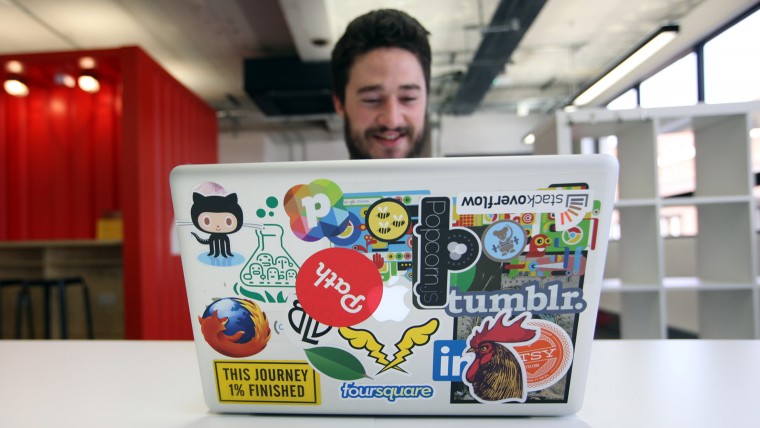Only five years ago the idea of joining an early-stage venture would have been unthinkable for many. But with technology on track to account for 14 per cent of GDP by 2016 and thousands of people taking the leap, Britain is rapidly turning into a nation of startups.
Alex Depledge, co-founder of cleaner bookings site Hassle.com, is a recent success story. She swapped her city suit for a startup after building a consulting career at Accenture.
The technical experience she gained from Accenture was invaluable. Hassle.com offers customers access to thousands of cleaners at a fixed hourly rate. The underlying technology behind it takes care of staff rotas, salaries and customer payments, presenting a huge technical challenge for the team. The gamble paid off as Hassle.com recently raised $6 million of funding, led by Accel Partners, the early investors in Facebook.
Armed with just a laptop and a good internet connection, entrepreneurs now launch their startups in a matter of hours at little to no cost
Once over the initial hurdle of leaving a secure career path, there are undoubtedly many other challenges ahead for new entrepreneurs, but thanks to technology, in particular cloud computing, barriers to entry have come down.
Armed with just a laptop and a good internet connection, entrepreneurs now launch their startups in a matter of hours at little to no cost. Gone are the days of waiting weeks for a business landline phone number, the expensive setup of corporate e-mail accounts and huge expenses for business software.
Startups now turn to cloud-based services, such as Google Apps, which offer professional level e-mail, calendar and documents services for as little as $5 per user per month. Google’s enterprise offering now boasts more than five million customers and is used by 60 per cent of the Fortune 500.
Skype also offers London-based telephone numbers that forward to your Skype account for a few pounds a month, offering small businesses the flexibility to work from anywhere in the world without losing potential business leads.
Startups no longer require costly server infrastructure to build infinitely scalable products for a global market. Companies including Amazon Web Services and Rackspace Cloud offer remote access to unlimited computing power at a fraction of the cost and can be set up in a matter of minutes.

Entrepreneurs can now set up their business in a matter of hours using their laptops
When it comes to building complex customer services systems, many startups turn to Twilio. It offers a virtual bridge connecting apps and services to text messaging and telephony services without the need for expensive infrastructure, and is trusted the world over by the likes of Uber and PayPal.
Ms Depledge is an advocate of using open-source and cloud-based systems like Twilio. Her technical team recently built a new voice-recognition system for their inbound contact centre by stitching together a number of existing free and open-source systems. “Our new system costs us £1.50 per customer,” she says. “Compare this to a similar system I built during my time at Accenture that cost £1 million and took two years to deploy.”
Despite the falling barriers to entry, access to funding is still critical. To tackle this, in 2012 the government introduced the Seed Enterprise Investment Scheme (SEIS) offering generous tax breaks to investors in early-stage businesses. It has been a huge success with more than 1,000 companies receiving investment totalling over £80 million in its first year.
“SEIS has now become a permanent feature and helps to create a strong environment for startups and digital businesses in the UK,” says Gerard Grech, chief executive of Tech City UK, the government’s body for technology policy.
Despite the recent boom in startups, critics and cynics of the British and European tech startup scene often point out the lack of billion-dollar companies as a sign of weakness compared with Silicon Valley.

Seed Enterprise Investment Scheme (SEIS) set up in 2012, has helped over 1,000 companies secure investment
As the saying goes, “Rome wasn’t built in a day”, and Silicon Valley has had a 50-year lead over the competition. But the UK, and in particular London’s Tech City, has in recent months raced forward with not one but two home-grown success stories achieving the elusive billion-dollar valuation in the first quarter of 2015.
In January, Shazam, a music discovery service raised a $30-million funding round, valuing the company at more than $1 billion. The service has grown beyond music discovery and now regularly features in television advertising campaigns, offering brands the opportunity to produce interactive experiences for consumers on their mobiles while watching prime-time shows. Recent successes have included partnerships with Bud Light and Jaguar during the Super Bowl.
A week later, Transferwise, known as the Skype of money transfers, raised $58 million led by Andreessen Horowitz, valuing the company at around $1 billion. Transferwise is now expanding into the US market and hiring aggressively.
With so many of the barriers to starting a new business melting away, it is no surprise that so many new businesses are being launched.
Whether you think it overhyped or not, there has never been a better time to make the jump from your desk job. With tech about to rival the financial sector in terms of contribution to Britain’s GDP, it is now a question of when, not if, the next billion-dollar startup is born.


